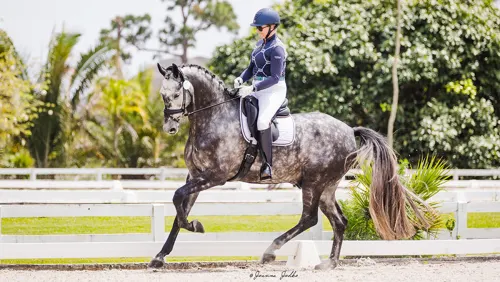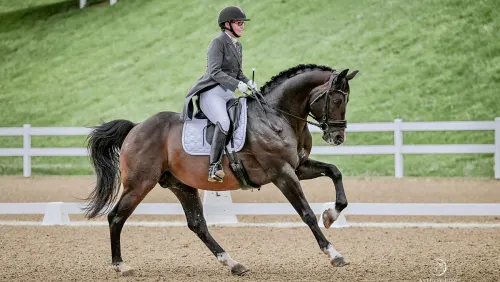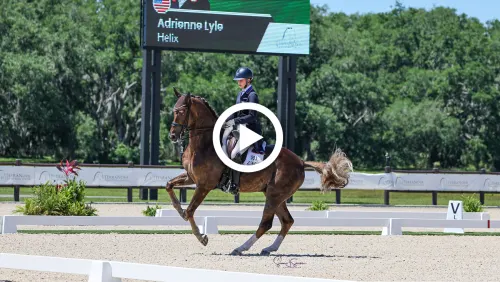August 7 — London.
Last night the British show jumpers celebrated after taking their first team gold medal in sixty years, but tonight the dressage riders one upped that victory by doing something no British team has ever done before: winning team gold.
In fact, the Brits have never won a dressage medal of any color, either in the team or the individual competition.
“I know it is an old cliché, but this is the culmination of many years of dreaming about it,” said Carl Hester. “It has shot our sport into a totally different league.”
The U.S. team was basically out of the medal hunt after the Grand Prix test, and they dropped from fifth to sixth place after the Grand Prix Special. Steffen Peters and Ravel finished tied for seventh with Germany’s Kristina Sprehe on Desperados on 76.25 percent, and Peters will contest the freestyle individual final on Aug. 9, where the scores go back to zero.
The fight for gold actually felt a bit like the previous day’s jump-off. The Grand Prix and the Grand Prix Special were averaged together equally for the team score, and Team GB came into the Special just half a point ahead. The Germans and the Brits drew back-to-back spots, so the order of go featured a German rider and than a British one, allowing the exuberant crowd to easily compare the scores.
Dorothee Schneider didn’t give anything away as the first to go for the German Team with Diva Royal, and she finished on 77.57 percent.
But Hester gave the Brits a shot of confidence when he took a huge lead on Uthopia with 80.57 percent, earning two 10s for his second extended trot and another pair of 10s for his position.
“I was coming here with a slight lack of confidence because my last two scores had been in Fritzens, where I’d had a 75 and a 77,” said Hester. “They were the third highest scores for our team, but they weren’t what I was attaining last year. To get back up to that level again, it’s great. It’s phenomenal. I feel like a new man.”
The next match-up was Britain’s Laura Bechtolsheimer on Mistral Hojris against Sprehe on Desperados. Both riders made mistakes. Desperados had a massive spook in the corner by H and earned straight 4s for the passage there as well as having another little bobble in the final passage.
“My horse was nervous because of the atmosphere and all the photographers at the far end of the arena. It took away from my own concentration,” said Sprehe, 25. “Such a mistake is costly.”
Bechtolsheimer, 27, ran into trouble in the lines of two- and one-tempi changes where Mistral Hojris just got a bit stuck behind. “I felt as though it was fantastic, although my mistakes in the changes were costly and annoying,” she said.
But despite the mistakes, Great Britain pulled into a more serious lead with Bechtolsheimer’s score of 77.79 percent versus Sprehe’s of 76.25 percent.
And having Charlotte Dujardin, 27, as last to go left Team GB feeling confident. Helen Langehanenberg, 30, put forth a valiant effort with Damon Hill, but her score of 78.93 percent was only good enough for fourth place.
Dujardin didn’t even have a perfect test. For the first time during the Olympics so far she appeared to be feeling the pressure based on the frown of concentration on her face. A slight jig in the collected walk and a mistake in the one-tempis showed that the unflappable Valegro might’ve been feeling a little tense too, but the eight 10s he received for various movements including his extended trot, half-pass left, two-tempis, passage and the final halt more than made up for the mistakes, and he easily achieved the highest score of the test with 83.28 percent.
ADVERTISEMENT
“I was a bit more nervous today going in,” admitted Dujardin. “I just wanted that gold medal so badly. I didn’t want to let anyone down.”
A Fantastic First
The possibility has been in the air for a long time that Great Britain might win gold with this dream team, but the riders still seemed a bit in shock after the medals were around their necks.
“It was very emotional for me. At the end of Charlotte’s test when I knew we’d done that, it wasn’t just about beating the Germans. It was about beating everyone else. Britain’s never done so in dressage,” said Bechtolsheimer. “I don’t think it’s sunk in completely yet. It’s an incredible feeling for all three of us. We’re really proud of each other and our horses.
“It’s a really fun team,” Bechtolsheimer continued. “Carl and Charlotte obviously work together, and I’ve known Carl since I was tiny because he started his career working for my dad. It’s a good dynamic. We all feel very comfortable with each other. We have a good laugh. Charlotte and I compete quite heavily over who does the dumbest blonde things. Carl sort of patronizes us. We have a great time. It means everything to stand on the podium with those two.”
Despite Germany taking team gold for the last seven Olympic Games, the three Olympic rookies weren’t at all disappointed to come away with silver. “Everybody asks us if we’ve lost the gold medal. No, we have won the silver,” said Langehanenberg. “We’re here with young and fresh horses. We’ve given our best, and we can be proud of this result.”
Americans Slot Into Sixth
After finishing fifth in the team competition in the Grand Prix test, the three U.S. riders would’ve needed to significantly raise their scores in the Special to get on the medal podium, and that was not in the cards. But despite dropping to sixth, the U.S. riders remained upbeat.
“I wish the scores would’ve been a little bit higher, but I’m really happy with the horse,” said Jan Ebeling, who scored 69.30 percent. “She went great. She didn’t really have mistakes. She’s been really good this whole week. She’s given her all, and that’s really all I can ask.”
Ebeling also was positive about the media frenzy over Ann Romney’s part-ownership of Rafalca in addition to Beth Meyer and Amy Ebeling.
“Having the mainstream media report on our sport so much has really been a great thing,” he said. “If just one young kid picks up riding and makes it to the Olympics, then my job is done. I think [the mocking tone of the press] is just business as usual. We’ve gotten so used to it. The positive thing is that the sport, not just the sport in America, but the sport of dressage, really has gotten a lot of coverage.”
A major mistake in the one-tempis and another bobble in the transition from piaffe to passage on the centerline meant that Tina Konyot finished feeling a bit flat on 70.65 percent.
“There were some very nice things, but you can’t afford to have mistakes,” she said. “Calecto is a little bit tired probably. He’s a big dark horse. When he first arrived here he was very fresh and happy. He’s still happy, but I can feel a difference. He’s been here for a while now, and it’s been constant. It wears on them a little bit.”
Steffen Peters looked like he was on track for a lovely mistake-free test when Ravel suddenly tripped on the centerline after his right pirouette and before the one-tempis.
“It’s hard to say [why he stumbled],” said Peters. “We recovered nicely and still got the nine one-tempis in and the pirouette afterwards.
ADVERTISEMENT
“I’m just excited that he still wants to do it after all these years,” said Peters. “He was right on. His half-passes felt great. I pushed the changes a bit more forward than the first day. The pirouettes felt really good. The piaffe was even better than the first day.”
He admitted he likely won’t be in contention for an individual medal. “With the top three they way they were, that’s a real tough one,” he said. “For that we’d have to already be at 80 percent. But this might be the last time that Ravel goes down centerline. I’m hoping that I can get one more really exciting freestyle in there.”
This is Ravel’s second Olympic Games. He won two individual bronze medals in 2010 at the Alltech FEI World Equestrian Games (Ky.) and won the FEI World Cup Dressage Final (Nev.) the year before that.
“Akiko [Yamazaki, Ravel’s owner,] and I have never mentioned the word retirement. But let’s face it. There’s really not much out there where he needs to prove himself. He doesn’t owe us anything. We owe him everything,” said Peters.
So he wasn’t concerned about where he might finish overall. “I’ve made the mistake before of going in there with a certain score in mind and riding the scoreboard,” he said. “I rode my horse today, and he was very generous with me. The bottom line is I love him.”
Tidbits
Peters is one of several riders who may be doing their last test with their horse in the freestyle at the Olympic Games.
Anky van Grunsven, who helped the Dutch team to bronze, said Salinero is definitely retiring after the freestyle.
“I didn’t have this color yet, so I’m really proud of it,” said the most decorated Olympic equestrian ever of her bronze medal with the 18-year-old Dutch Warmblood. “I’m really happy. He deserves a good test. For me it would be a great goodbye.”
Dorothee Schneider will give Diva Royal back to her student, Stella-Charlott Roth, who owns the horse. Both riders have spent time training the 10-year-old Hanoverian mare (Don Frederico—Weronika, Warkant), and Roth agreed to lend Diva Royal to Schneider to see if the pair could make the team.
Both Valegro and Uthopia will be for sale after the Olympic Games, although Hester insisted they aren’t sold yet.
“They will be going home with us on Friday and will go in the field on a holiday until we make decisions for the future,” he said. “I’ve had Uthopia for six years, and the plan always was that I could ride him until the Olympics, and then he will be sold. The people who own these horses have let us keep them for the Olympics. That was a huge risk. Both are very talented, and other people have wanted to buy them and ride them.”
This was the first Olympic Games to include a Judging Supervisory Panel, three judges who may change the scores of the seven officials judging the test if they spot a mistake.
In the Grand Prix, 50 horses competed, and the JSP changed marks on 20 horses and a total of 59 times. Thirty-two horses contested the Grand Prix Special, and 26 marks were changed on 12 horses. Altogether 85 changes were made over three days out of 12,600 marks given.
“It only sharpens our judging. We are very happy to have the JSP,” said Leif Tornblad, president of the ground jury in the Grand Prix Special. “It makes us more secure. It’s not so significant that it actually changes the placings at these games, but we judge better because we try to avoid being caught. But that’s unavoidable, because we do sit in different places, and it can be very difficult to see.”
For full results, visit the London 2012 website.















